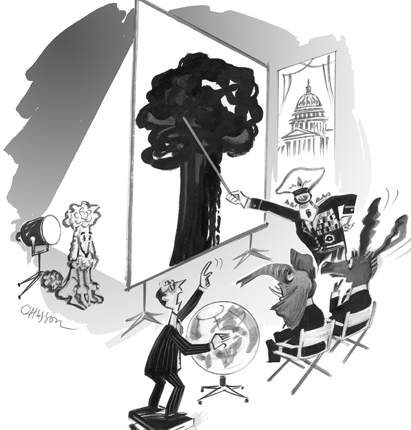|
Home | More Videos | About Us | Contact | Subscribe | Donate

"Drowning people in fear is the key to power"
Threat inflation
|
|
|
Subscribe to Brasscheck TV
Your e-mail address is kept absolutely private
We make it easy to unsubscribe at any time
|
|
Recommended article...
Threat Inflation: Going after hapless countries
By Edward Herman
(co-author of Manufacturing Consent: The Political Economy of the Mass Media)
Z Magazine
March 2003
 One of the most striking features of the working of the U.S. imperial system and media is the regular inflation of the threat posed by imperial targets—an inflation process that very often attains the ludicrous and incredible. When the imperial managers want to go after some hapless small country --Guatemala, Nicaragua, Yugoslavia, Iraq -- that for one reason or another has been put on the U.S. hit list, the managers issue fearsome warnings of the dire threat posed by the prospective victim. The media quickly get on this bandwagon and suddenly give enormous attention to a country previously completely ignored. Critical analyses of the reality of the “threat” are minimal, and the gullibility quotient of the media escalates in view of the alleged seriousness of the threat and need for everybody to be "on the team." As soon as the small target is smashed—with great ease, despite the prior claims of its capability—and as official attention moves elsewhere, the media drop the subject and allow the target to return to black hole attention. One of the most striking features of the working of the U.S. imperial system and media is the regular inflation of the threat posed by imperial targets—an inflation process that very often attains the ludicrous and incredible. When the imperial managers want to go after some hapless small country --Guatemala, Nicaragua, Yugoslavia, Iraq -- that for one reason or another has been put on the U.S. hit list, the managers issue fearsome warnings of the dire threat posed by the prospective victim. The media quickly get on this bandwagon and suddenly give enormous attention to a country previously completely ignored. Critical analyses of the reality of the “threat” are minimal, and the gullibility quotient of the media escalates in view of the alleged seriousness of the threat and need for everybody to be "on the team." As soon as the small target is smashed—with great ease, despite the prior claims of its capability—and as official attention moves elsewhere, the media drop the subject and allow the target to return to black hole attention.
A closely related feature of the threat inflation process has been the unwillingness of the media to allow that the United States poses any threat to the imminent victim. U.S. officials may even have announced an intention to displace a government, they may have organized a proxy army to invade, and positioned their own forces in the vicinity, but any actions of the target to prepare to defend itself are considered sinister and further proof of their menacing character. In the Cold War era, when targets reached out to the Soviet bloc to get arms, this added to the proof of a threat, demonstrating that they were part of the larger Soviet threat. That they sought weapons from the Soviet bloc because they were prevented from buying them from the United States and its allies, and that forcing them to do this was part of a strategy making their threat more credible, was outside the orbit of media thought.
Thus, in the official and therefore media view, threats were and remain unidirectional—democratic Guatemala (1945-54), Sandinista Nicaragua (1980-90), Iraq today have allegedly posed threats to the United States, but they themselves are not threatened by it. This results in part from the media’s ideological and patriotic subservience. Just as in a totalitarian society, the media here take it as a premise that their leaders are good and pursue decent ends, so that invidious words like “threat” or “aggression” cannot be applied to their language and behavior. This is helped along by the fact that the targeted leaders are quickly demonized, so that any apparent threats from our end are a response to evil and quest for justice (as well as countering a real threat). This exquisitely and comically biased perspective has helped make it possible to find that no actions by the targets constitute "self defense," and in effect they do not have any right of self-defense.
Continue reading here



Brasscheck TV's answer to the normal human question: "What can I do?"
For more War is a racket: videos, click here
See the complete catalog of
brasscheck tv videos
About Us | Information for subscribers | Privacy Policy | Contact
|